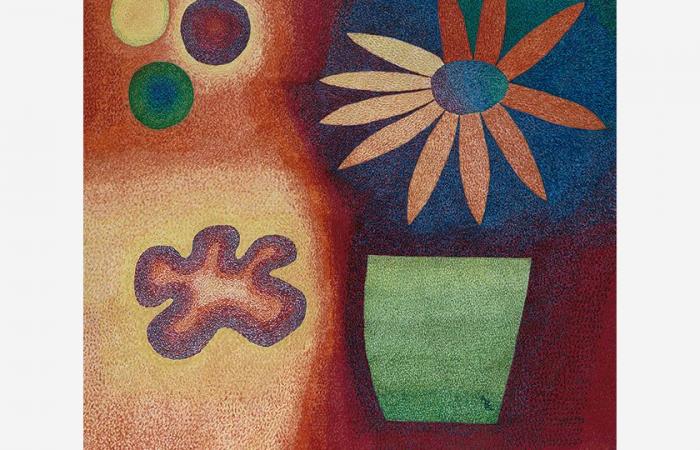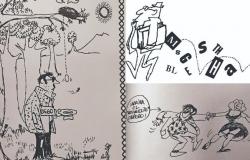This book by María Mascheroni, this River Plate blues, begins with a question about joy: “Doesn’t the clarity of the morning shine around us? Are we not surrounded by a soft green grass, the kingdom of dance? Would there be a better time to be happy? It is the epigraph of the book and is signed by Nietzsche. More than a question, it is an exhortation: joy is inserted in the question with the strangeness of those who do not find it there; and wonders about the conditions of light that, more than making it possible, make its absence impossible.
Today we are far from the Ode to Joy, from the romantic intoxication of the Revolution that made so many heads and illusions roll. These restless souls do not sing an ode but a blues, they advance obliquely pursuing the plot that unites us in a seamless center. As if María Mascheroni wanted to see not through curtains but through walls, to pierce the opaque not to clarify it but to put it in the light, to support the light and force it to house the darkness without canceling it. An obsession with light – nothing to do with white but with clarity. It is this light, the intermittent trail of it, that Mascheroni pursues, the way in which it bursts in anywhere as a Center.
The center begins being luminous, the circle incomprehensible. But is the center of that circle? There are several constellations spinning. How to bring the luminous center closer to an incomprehensible circle? I venture that this was the poetic challenge that María Mascheroni posed when writing this blues.
Poetry belongs to another time than life, says Bachelard, to a vertical time that immobilizes life in an essential simultaneity in which the most dispersed and most disunited being conquers its unity. This time no longer runs or has a measure: in it the antitheses contract into ambivalences, and we no longer find succession between events, neither causes nor antecedents. Ambivalence that keeps us in suspense, suspended in a joy that carries within itself a fragility that does not come from the future or the past but from itself, from its almost unbearable complexity. It is the deployment of that “almost”, which builds a vertical time to experience the fugitive and fleeting, which we have to infinitely thank those who manage to build a Poetic Instant.
There is an area that is not planted, writes María Mascheroni. And suddenly, like a slap, the idea that he is talking about writing, poetic writing, hits me. Far from the happy and unhappy metaphors of life cycles, alien to the successful or unsuccessful investments of social life, there is an area that is not barren but that is not planted. A fertile area (even that fertilizes us) without anyone having planted it. Sowing calls for harvest, you sow to reap, you harvest only if you have sown; but in this Zone what no one has sown bears fruit.
The thing is done in some place that we do not distinguish by some force that we do not know. The first reaction, of anguish, gives way to a peace that is neither that of stillness nor that of negotiating a truce.
What happens then? Of what rare species is this fertility?
This area that is not planted has effects: a blow of words can lead us to ecstasy or suicide, to a clandestine drunkenness, not very communicable, useless and tremendously immense.
As in the poem on page 57: When our joy also awakens when we open our eyes / and exists like the perfume of jasmine / or orange in the orange / what has happened? where walled did joy live? // and later, when the body moves lightly / and ignorantly through the rooms / what is the breath, the life that it lives?
Just as joy awakens when you open your eyes or perfume awakens jasmine, and we do not know how or why or when, the areas that are not planted are not because they are sterile, they are unknown to us in the way in which they offer us their fruits. . The joy of living, the perfume of jasmine, the orange of orange: random coincidences or ways of being? Could the jasmine be deprived of its perfume, walled after the sting that reversed its fate; or find ourselves with a gray orange?
“Evidence” is what is at issue here. But not to pass it by but to delve into that fold where things are what they are: that mystery.
The tree was made for the bird / the bird sleeps on the branch / and it does not fall? / in balance even if the wind is strong / how they sleep without falling the tree knows / without trunk / or root / they dream in the tree like trusting children / the tree loves birds.
Tautologies, logic says, are self-evident statements, they contribute nothing, they say nothing. “The table is a table”, “I go up the stairs”, “it is cold since the temperature has dropped”. Obvious and redundant, they are always true and, for that reason, always empty. But there is a madness in tautologies, an inexplicable plus where the effort to understand comes close to the fatality of having understood.
The evidence pecks at the vision, writes Mascheroni. And he stalks the half-open area between what is seen and what is seen: the orange in the orange, a clearing in the clarity.
If these tautological statements say nothing and are not absurd, what do they do then, how do they take us to another dimension: that of a repetition that when it repeats does not duplicate what there is but, how can I put it?, excavates it, or saturates it, so that it takes on an aura of being, a plus where joy and misfortune are neither discernible nor judgeable.
I read somewhere that poetry temporarily disorganizes the soul. As I write this text, propelled by this blues not like a rocket but like the slow wake of a wave that rises from meters and meters below the waters, unleashing ideas and sensations, I realize that it makes me happy – in a sense that It has nothing to do with Happiness.






